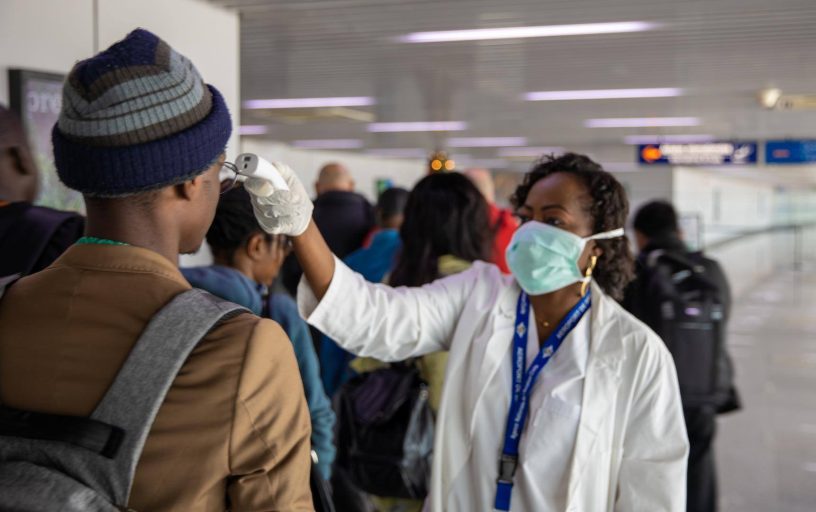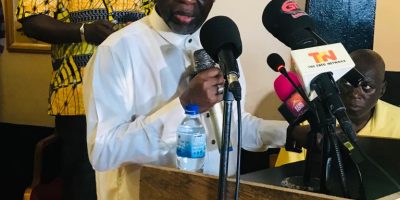 by Alagi Yorro Jallow
by Alagi Yorro Jallow
FATOUMATTA: Africa is overwhelmed. Businesses have been affected, and the 29 Exchanges in Africa, representing 38 nations capital markets (stock markets) performances are down, lives are threatened. China is engaging the world as the epicenter of a crisis, the global economy is likely to be affected given Africa’s strategic importance, and yet nobody knows when the Coronavirus will ease off, or when scientists will find a cure.
Public health experts worry that the coronavirus epidemic could spread into African countries with high volume traffic to and from China, leading to devastating consequences due to inadequate medical services on the continent. However, there is an estimated 1 million Chinese now live in Africa after years of massive Chinese investments in the continent. Tens of thousands of Africans reside in China as students or traders.
Fatoumatta: According to The Lancet medical journal, an analysis determined that Egypt, Algeria, and South Africa were at the highest risk of contracting the virus – although these three nations are reasonably well equipped to cope with an epidemic. The journal further stated that other African states like Nigeria, Ethiopia, Morocco, Sudan, Angola, Tanzania, Ghana, and the Gambia have less risk of infection, but would be more vulnerable in an epidemic due to their inadequate health care services.
Fatoumatta: There is an emotional ambivalence that is characterized by the prospects of a coronavirus outbreak in Africa. On the other hand, its spread is class-neutral. Which means it would affect the rich and the poor in similar ways. Perhaps its outbreak would force our leaders and policymakers to rethink the neglect of the public health care system. Let the flights from China to Airports and Seaports continue. The risk of the Coronavirus embodied in allowing the flights and vessels to continue might reshape our politics and public policy in previously unimaginable ways. Moreover, the good thing is that if the virus enters African countries, it is more likely to start ravaging those who travel by air or those who are in close proximity to those who travel by air. Which is another way of saying the first victims will, in all likelihood, be senior or middle-level government officers and business elites?
Fatoumatta: Africa’s influential politicians and the wealthy, as well as senior civil servants and State officers, must know that due to their constant international travel and exposure to foreign contacts, they are in the first line of exposure against this global epidemic. Just recently, none other than the Deputy Health Minister of Iran and a parliamentarian became one of the first Coronavirus victims in that country. As a health sector bureaucrat, failure to put in place adequate isolation and treatment facilities is first a score against self, for there is no “private” isolation bubble against viruses or medical emergencies.
Fatoumatta: During the outbreak of the Ebola virus epidemic in West Africa, particularly Guinea, Liberia, and Sierra Leone, it has exposed the underbelly of many of Africa’s healthcare systems. They are often poorly funded, severely neglected, and, in some cases, virtually nonexistent. The disease’s virulence had overwhelmed health systems that even before Ebola lacked essential equipment and facilities, medical staff, and supporting infrastructure.
Fatoumatta: Ebola has shaken and awakened decision-makers in a way that malaria, tuberculosis, and other epidemic diseases that claim millions of lives in Africa each year have failed to do, with the possible exception of HIV/AIDS. The disintegration of the health care systems in the Ebola-affected countries as well as in the African continent is already having a profound impact on the population’s health beyond Ebola, as clinics close or become overwhelmed or nonfunctional. To exacerbate the situation, these health systems, including the general infrastructure, were wrecked by internal conflicts and civil wars, also with a kleptocratic rule to the point where they now struggle to provide primary health care to citizens.
Fatoumatta: It is not only Africa that is at risk, and it is the entire world. Africa’s civilization is under threat, and of course, the tragedy is human-made. These are the cold, uncomfortable facts. The Corona Virus has brought the entire world to the precipice of uncertainty and disaster besides exposed the incompetency of political leadership and reduced the health care delivery system. It reminds us collectively of our mortality and the common humanity and vulnerability that we share in our inadequate health care system infrastructure. Africa does not have enough doctors and nurses to meet even the primary health care needs of its people. Another epidemic would overwhelm its fragile health care systems. As such, most African health care facilities are not equipped for a virus epidemic.
Fatoumatta: Unfortunately, many disease surveillance systems throughout African countries are weak, and most of the continent lacks diagnostic capability, for example, laboratory capacity, so identifying cases and controlling the outbreak could be difficult, especially in resource-constrained countries.
Fatoumatta: Russia closed the border with China, Italy has towns locked down; Japan has closed all schools. While our beloved Africa sleepwalks into a major catastrophic and monstrous calamity, our hospitals are Ill-prepared, our doctors and nurses in apparent danger, on regular days they do not even have gloves, they already risk a lot, Coronavirus will surely wipe a lot of our doctors and nurses.
Fatoumatta: Having African countries on lockdown is a death sentence to many; they live from hand to mouth, for a majority of Africans lockdown means starving and waiting to die, they do not have stockpiles of food, they have shared with locust’s half of it already.
Africa’s best bet is in ensuring the virus never gets there, sealing their borders and educating the masses, they are doing the opposite, playing with fire, and soon they will have to endure the consequences. The airport staff is being exposed to severe danger. Now is the time for unions to protect their workers and demand common sense prevails before the Coronavirus prevails.
Fatoumatta: It is no secret that most senior civil servants, especially those responsible for public policy formation and delivery of services, do not use essential public services. When HIV/AIDS finally landed in Africa, decades ago, we had no adequate infrastructure and no people-power mobilization to force politics and policy to address it. In the US, it was reined in by a powerful movement of activists, patients, and fed-up citizens who marched and lobbied and camped outside a White House that was complacent about addressing the scourge meaningfully– watch the documentary “How To Survive a Plague.” Black Africa. No one cares about our lives except ourselves. To many outside Africa, African lives are just as dispensable as dik-dik roadkill. Ask the Chinese. It is on us to fight for the sanctity of the breath in our black beings, to the last human. We matter. We have irreplaceable value.
Fatoumatta: Collectively, we can run away from the consumption of other forms of public services, but we cannot escape the detrimental effects of a malfunctioning public healthcare system. Even with expensive private health facilities have limits that are breached, many of us revert to the public healthcare system for treatment, irrespective of social status.
Emotional Ambivalence Characterized The Prospects of Coronavirus Outbreak in Africa




Ma sha Allah great and thanks for sharing